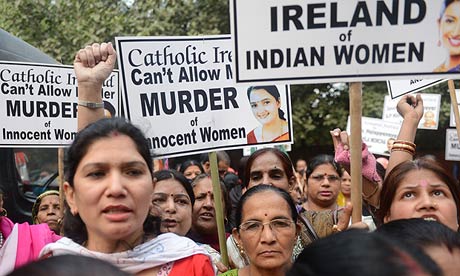
Hundreds of Irish women, including dozens who had been raped, have life-threatening illnesses or are under the age of 16, have been forced to seek abortions in Britain in the past three years, a pro-choice charity said.
As campaigners prepared to gather in central Dublin on Saturday for a rally to protest against the death of an Indian woman who was refused a potentially life-saving termination in an Irish hospital, the Abortion Support Network (ASN) gave an insight into the pressures facing women with unwanted pregnancies.
The charity, which issues grants of between £20 to £700 to Irish women seeking terminations, said it had helped 335 women from the Irish Republic over the last three years – including 19 rape victims, 21 with severe health problems and 21 girls under 16. A further six had attempted suicide in the recent past, the group said.
It has also enabled 238 women from Northern Ireland to obtain abortions in England. The region is the only part of the UK where the 1967 Abortion Act does not apply, although the type of emergency termination denied to Savita Halappanavar is available to women with life-threatening conditions in Northern Irish hospitals.
Mrs Halappanavar's death in University Hospital Galway from blood poisoning due to a miscarriage has refocused global attention on the near-total ban on abortion in Ireland.
Her husband, Praveen Halappanavar, has described how his wife pleaded for a termination in the hospital but was told the medical team could not carry out an abortion as they had detected a foetal heartbeat.
When the 31-year-old dentist said she was a Hindu, Praveen Halappanavar said the couple were told: "This is a Catholic country." His wife died on 27 October from septicaemia. He believes it was caused by the hospital failing to abort the 17-week-old foetus, which was already dead.
India's ambassador to Ireland said on Friday that Mrs Halappanavar may be alive if she had been treated in India, where abortion is legal if the mother's life is at risk. Debashish Chakravarti said her death had caused great anguish within the Indian community in Ireland and in India.
As Ireland's politicians study an expert report into potential changes to the abortion law, the ASN released testimonies from some of the women it had helped. All them asked not to be identified for fear of intimidation or vilification in Ireland.
The charity said one woman was seven-weeks pregnant when she asked for the organisation's support in October – the same month Savita died. A recovering alcoholic and drug addict with children in foster care, she has been diagnosed as severely depressed and tried to kill herself to abort the pregnancy.
Her family had not been not very supportive and, she said, her ex-partner "doesn't want to know". On contacting the network, she said: "God forgive me for this, but I know I won't." She also had no passport but managed to borrow €80 (£65) from friends that would cover the bus and boat journey to Britain. The ASN had to help her with the funds to pay for the procedure.
Another client contacted the ASN in April, just nine months after having chemotherapy for breast cancer. She had three children and no passport. She was struggling financially, describing her situation as "desperate". She's never had a loan, and knows she wouldn't be able to keep up with the repayments if she did. She did not want to tell anyone, and told the charity workers she had no other way to get money for the termination.
A third woman contacted the group at the start of this year with this harrowing message: "Please help me. I got your website and I'm in Dublin. I'm four to five weeks pregnant. I was told I cannot get a termination here even though I am on long-term medication for a psychiatric illness since I was 14. I am 26 now.
"I'm confused. I'm highly depressed, suicidal and I just need some help – any help! I'm probably not making much sense. I'm upset and confused, feel very alone and my life is a nightmare. I'm sorry, if you could ring or email me soon as you can, thank you so much."
The ASN also recorded this message from a member of the Irish Traveller community: "I'm a Gypsy girl and we're not supposed to have intercourse before we get married.
"And if they find out they will actually kill me. I'm not kidding." She later told the Abortion Support Network that she was pregnant as a result of rape.
Commenting on the fallout from Mrs Halappanavar's death and the numbers of women contacting them, Mara Clarke, director of the Abortion Support Network, said: "I am not an expert on the abortion law in Ireland but I am an expert on what happens to women when abortion access is restricted. The avoidable, disgusting, tragic, heartbreaking story of Savita Halappanavar is what happens.
"Even if you take out the other circumstances, at the heart of this story is a young, professional, educated woman who asked her doctor for an abortion – by all accounts begged her doctor for an abortion – was refused, and then she died.
"Let's stop talking about whether or not abortion is right or wrong. When you ban abortion, you change it from being an issue of morality to an issue of class.
"The majority of the women who have contacted Abortion Support Network were religious women who believe with all their hearts that abortion is killing a baby and that they will burn eternally in hell for having an abortion. And yet they are still having abortions."

